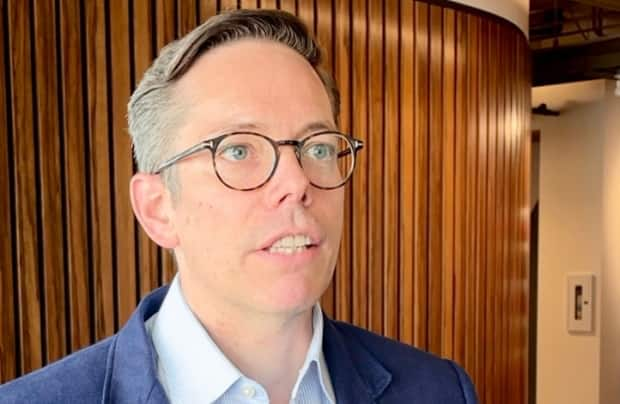Impact of inflation is harsher in Alberta, says economist. Pins blame on population boom

The population boom in Alberta has depressed wages and means the impact of inflation is being felt more acutely here than anywhere else in Canada, says a local economist.
Charles St-Arnaud, chief economist with Alberta Central, said people in Alberta are paying the same increased prices for things like groceries, gas and household goods.
But they're not getting the same raise at work to help cover the costs.
That's because of Alberta's boom-bust economy, but also because many people are moving here — record numbers from across Canada and internationally.
"Having a constant supply of new workers helped keep our wages lower than the rest of Canada," said St-Arnaud, who published a report with this data last month.
"You have more available workers, and those firms don't have to compete as much for workers as what we're seeing in the rest of the country."

In his report, St-Arnaud tracked wages and inflation since 2019. Wages in Alberta increased, but not as fast as wages in the rest of the country. And when adjusted for inflation, real wages in Alberta actually dropped.
That means people's purchasing power dropped by four per cent in Alberta, while it increased by three per cent in the rest of the country.
The provincial government launched the Alberta is Calling campaign last August, citing a growing labour shortage. As of the end of 2022, there were still 93,000 vacancies, according to Statistics Canada data, especially in industries that require employees with specialized skills.
But when CBC Calgary reached out to Calgary residents to ask about work through our text messaging community, many said they were struggling to find jobs that paid more than minimum wage. Many were struggling to keep up with their bills and worried the marketing campaign was making things worse.
St-Arnaud said the population boom is also leading to higher unemployment, now at 6.6 per cent, the highest of any major Canadian city. But he's impressed it's not higher still.
"Considering the size of the gains in the population, not having (a larger) increase in unemployment was quite remarkable. That means the economy is strong enough to absorb so many new workers coming to our province."
'A losing battle'
Harman Bedi is among those worried. He has a masters in kinesiology and a diploma in supply chain management. But he's been looking for a steady job in his field for a decade, picking up contract jobs in the meantime. Volunteering and networking to find an opening hasn't worked so far.

Bedi says Canada needs to make sure it plans for rental housing and other job opportunities to make sure that's in line with immigration.
"I almost feel like it's a losing battle," he said. "How many people can we actually absorb and still make sure people have opportunities and the standard of living is high?"
Ashish Verma is one of the thousands of new arrivals who answered the Alberta is Calling campaign. He moved to Calgary last summer from Surrey, B.C., to find cheaper rent and a job in the tech sector.
Before coming to Calgary, he worked as a real estate photographer and in restaurant management. Once here, he upgraded his skills to work as a website developer, but he can't find work after applying for approximately 400 jobs mostly through Indeed, LinkedIn and the federal government's Job Bank.
"I haven't found anything in tech yet. I haven't had any single interview from any companies," said Verma.

His wife landed a full-time accounting job and that's how they've been getting by. But he says it's the first time he's had to use a credit card to pay for groceries and utilities.
He hasn't given up yet but says some days he regrets moving.
"When you see, you know, the dream that you came here for is not being realized — after so many months — it's disappointing and depressing."
"Being a Canadian citizen here and I'm still struggling to find a job. People who are coming here (from overseas), I don't know what's happening with them," he said.
"It's hard to even think about that, how they're coping with all these things."
Job vacancies slowly falling
Trevor Tombe, economics professor at the University of Calgary, said it's hard to say how effective the Alberta is Calling campaign has been. Many people would be moving here for work opportunities anyway.
He said the number of job vacancies has been dropping faster in Alberta than elsewhere, which suggests many of the people coming here already have jobs lined up.
As for those who are still struggling to find work, Statistics Canada has limited data on what kinds of jobs they left or are looking for. But it does track employment by education level.
In 2022, roughly 60 per cent of the unemployed Albertans had some kind of post-secondary credential, and of those, 30 per cent had a degree.
Yet only 10 per cent of the jobs that were being offered required a university degree, said Tombe.
However, Tombe said, "the number of vacancies is still at historic highs.… There's many more unfilled job postings out there per unemployed individual. That's true in Alberta and it's true nationally and it is kind of an unusual feature of the economic recovery from COVID."
Job vacancies in Alberta
As for Verma, the website developer, he says he's going to continue to pursue jobs in the city's tech sector. But he's giving it only another month or two before considering a return to B.C.
Verma says his wife and young daughter would stay here while he would use his B.C. connections to land a job there.
"It's been eight months and still trying to make ends meet … to find a job where I can actually start working," he said.
"That flame, you would say, that fire in me that I had when I was moving here, that has gone down a little bit."
How about you?
Join our text-messaging community and share your experience with work and how it's been changing. Add your cellphone number below. It's free and confidential. Unsubscribe any time by texting STOP.
Bryan Labby is an enterprise reporter with CBC Calgary. If you have a good story idea or tip, you can reach him at bryan.labby@cbc.ca or on Twitter at @CBCBryan.


